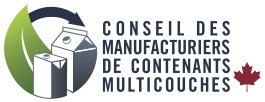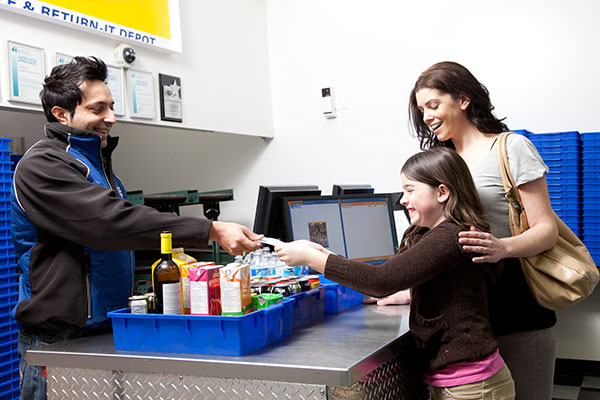The majority of Deposit Return Systems (DRS) around the world limit the scope of targeted beverage containers to bottles and cans. In Canada, however, modernization and innovation have resulted in DRS that are broader in scope and include beverage cartons.
In September 2022, Carton Council of Canada’s Managing Director, Isabelle Faucher, set out on a tour of various beverage recycling systems, to see for herself how they operate, what they have in common, and how they differ from one another.
British Columbia
British Columbia is home to Canada’s oldest DRS, operated by the Producer Responsibility Organization (PRO) Return-It™.
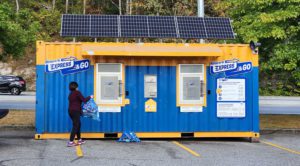

One of Encorp’s “Express” solutions includes unstaffed solar-powered drop-off stations with extended hours and contactless service, such as this one located in the parking lot of a Superstore in North Vancouver. [Click to enlarge image]
In recent years, Return-It has further worked to increase the level of consumer convenience by deploying a number of “Express” locations, which involve consumers tagging their bags, dropping them off, and having their refund credited to their account within a few days, rather than having to sort containers and wait in line to receive their refund. As of the end of last year, there were 89 “Express” locations in place in B.C. and that number is expected to grow.
In 2021, the combined beverage carton redemption performance (gable top and aseptic cartons) in B.C. was 63%. It’s worth noting that the inclusion of milk and plant-based beverage cartons now makes it easier for Return-It to communicate with consumers (i.e., return ALL your beverage cartons for a refund). It is hoped that this will in turn result in higher redemption performance moving forward.
Alberta
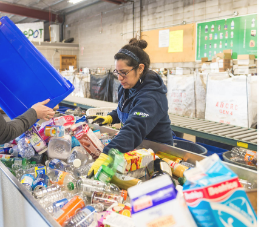

An attendant at a depot in Alberta sorts containers returned by a consumer. Photo courtesy of ABCRC. [Click to enlarge image]
While the deposit amount on containers up to 1 L is 10¢, larger formats require a 25¢ deposit. This is the main reason why the number of sorts carried out by depots is above 20. Another notable difference between Alberta and B.C. is that depots in Alberta do the actual sorting work, while in B.C. consumers must sort their own containers. Of course, this is reflected in the compensation depots receive in the respective provinces.
Similar to B.C., some depots in Alberta have invested in automation. Others, such as the Saddle Ridge Bottle Depot which was visited as part of the tour, estimate that automation would only allow for a one-minute gain in efficiency (they estimate that the average customer is out in 6 minutes, vs 5 min for an automated depot).
Manitoba
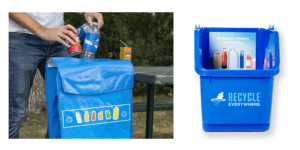

The Recycle Everywhere program makes available collapsible Bin Bags for cottage & campground use where recycling collection isn’t as convenient or for residents who do not have access to curbside recycling collection (left). The program also makes available a Mini Bin, designed to increase beverage container recycling in Manitoba’s multi-family dwellings (right). Photo courtesy of CBCRA. [Click to enlarge image]
As we reported in a previous blog, more than 70,000 Recycle Everywhere bins have been placed in schools, parks, businesses, communities, municipalities, and other locations. Bins and signage are provided at no cost to these locations and the program includes a significant, province-wide education and awareness component. In part due to these efforts, the beverage container recycling rate in Manitoba grew from 42% in 2011 to 72% in 2021. The carton performance for 2021 is 73%[1].
Modernization on the way
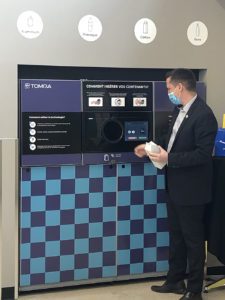

A first phase of DRS pilot projects were deployed in Quebec between August 2021 and January 2022, during which new automated collection equipment, such as the one pictured above, were tested. A second round of pilots launched in late October 2022 in Victoriaville (testing a kiosque solution) and Quebec City (testing a bag drop solution). [Click to enlarge image]
New Brunswick is also working to modernize its DRS, which has remained the same for over 30 years. The modernization involves moving the system to an Extended Producer Responsibility (EPR) framework and is expected to be in effect by April 1, 2023. Changes will be required in the Beverage Containers Act to allow for the implementation of an industry-managed Container Recycling Fee (CRF), similar to what is in place in BC and Alberta. Other key changes include the PRO taking on responsibilities related to collection depot licensing and compliance standards, as well as those pertaining to public outreach and education campaigns to increase consumer participation in beverage container recycling. Milk and milk substitutes will continue to be excluded from the DRS and will instead be collected as part of the EPR system for packaging and paper, which is expected to be deployed in 2023.
Although the diversity of Canada’s beverage container recycling landscape can at times be challenging to keep track of and navigate, it does offer a wealth of lessons and experiences to draw from, not least of which is its inclusiveness of beverage cartons. This is a key feature that policymakers around the world should take note of.
[1] This is the 2021 value reported by CBCRA for all non- alcoholic, non-dairy cartons supplied in Manitoba (i.e., it includes both the performance of the residential and the away-from-home programs). Dairy cartons are excluded from this value because they are not part of the Recycle Everywhere program.

